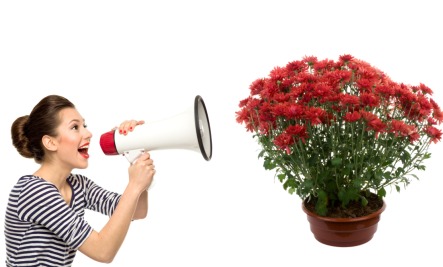Do you talk to your plants? Many people do. The real question is whether this makes a difference or is even more interesting: do plants talk back to you?

There are three kinds of plant communication
- Humans talking to plants: gardeners
- Plants talking to humans: nature lovers
- Plants talking to themselves: surviving
1. People talking with plants is the most common.
I’ll admit I am not an avid or experienced gardener like Diana , but I still find myself telling my new seedling how happy I am with them and giving them encouragement. I sometimes also curse the weeds (read Eat, Pray Love Weeds) but not with the same intensity.
Mythbusters Proves Talking Helps (kind of)
Mythbusters exposed seven small greenhouses to various conditions. Two were exposed to negative speech, two to positive speech, a fifth with classical music, and a sixth with intense death metal music. A seventh greenhouse, used as a control sample, had no stereo. (speech and music were supplied by recorders)
You can see videos and details at this link Talking to Plants Proven.
Surprising Results:
- The greenhouses with the recordings of speech grew better than the control
- There was no difference between the kind or angry talk
- classical music plants grew better than controls
- intense death metal grew best of all!
Month Long Royal Horticultural Society study also discovered that:
- Talking to your plants can really help them grow faster (compared to controls).
- Plants grow faster to the sound of a female voice than to a male voice.
- Plants grew best to the voice Sarah Darwin, granddaughter of was legendary botanist Charles Darwin, reading a passage from the On the Origin of Species
Neither of these studies were large scale or double blind. The Mythbusters results were perhaps influenced by the fact that the plants were exposed to recorded voice and sound rather than real humans who were feeling and looking at the plants.
Plants Feel Emotions Too:
The fact that the study did not have live humans is important according to Cleve Baxter, famous for his experiments revealed in the famous book, “Secret Life of Plants”
Cleve found that polygraph readings detected emotion in plants just as they do in humans. Cleve Baxter knows this field as well as anyone. He founded the CIA’s polygraph unit shortly after WWII and founded The Baxter School of Lie Detection which is the longest running polygraph school in the world.
Some research seems to indicate that certain frequencies activate certain genes in plants. Other researchers claim plants can read our minds or at least react to our thoughts.
For myself, I understand that plant food affects us on so many levels that it is very possible that happy plants would grow better and be more nutritious for us.
2. Plants Talking to People:
This is more interesting to me since perhaps as a human I can learn something.
All ancient cultures insisted their knowledge of plant medicines came from the plants themselves and not through trial-and-error experimentation.
Less well known is that many Western peoples made this same assertion; – people like Luther Burbank who developed the potatoes you probably eat in fries or potato chips.
Currently the forefront of this area is Stephen Buhner who wrote The Secret Teaching of Plants.
It is one of the best books on health/spirituality a I have even read. You can read my review of his book here: Practical Guide to Plant Communication.
Diana also interviewed him which you can listen to here:
[audio:http://realfoodsforlife.info/wp-content/uploads/2010/06/stephen-intro-can-we-talk-with-plants.mp3]The larger interview is here: Talking With Stephen
Stephen not only reveals some amazing facts about how our bodies work but also concrete lessons on how to directly communicate with them. His approach is both intelligent and heartfelt.
3. Plants Talking to Plants:
“Everyone knows plants react to light and scientists also know that plants use volatile chemicals to communicate with one another, for instance, when danger, such as a herbivore approaches” says Monica Gagliano from the University of Western Australia.
She showed that maize plants make teeny tiny clicking noises with their roots and bend their roots towards similar sounds. who would have imagined?
What do you think? Do you talk with plants? Do they talk back?




I have a small Patio Garden and I love eating breakfast on my Patio and talking to my Plants?
Do you talk to Plants too?
Ever since I started not only talking but touching my plants, they’ve bloomed. I was truly amazed. I really do belive it makes a difference.
love this; read The secret life a long time ago; it makes so much sense to me, though I find it interesting that in the experiments a kind or an angry voice was no different and that death metal ‘music’ was effective…perhaps there is no judgment in the consciousness of plants, unlike humans…
Yes I love this too Annie. Yes interesting about the angry voice.
I learned the words we use are unimportant. Merely breathing on plants is just as effective. When we exhale, we release carbon dioxide, and that’s what benefits the plants. So, it doesn’t matter whether we say good words whether we say swearwords or just breathe on our plants, they all affect the plants the same way. The carbon dioxide is what makes the difference.